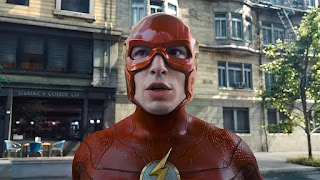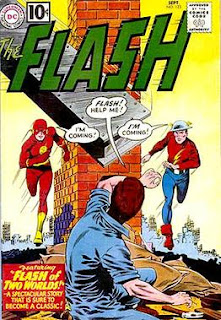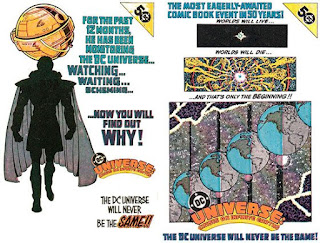What began with so much ambition ten years ago with Man of Steel in 2013, gurgles its way to a watery grave with this weekend's release of Aquaman and the Lost Kingdom. I feel bad for director James Wan and everyone involved in A&TLK as this project arrives with an air of total futility about it. Honestly, even if it wasn't already known that the DC cinematic universe was due to be rebooted, I think A&TLK would have had the same inevitable last gasp vibe to it. Exhaustion clings to this movie like barnacles to a boat. It feels like the DCEU has been utterly played out.
In 2018, the first Aquaman was a breath of fresh air for the DCEU. Colorful, unabashedly embracing of its fantasy elements and bereft of any hint of dreary edge lord attitude, James Wan showed that the DC universe could go all in on fun and that audiences would respond. It became the most successful film in the DCEU, bringing in the kind of box office results that were typically associated with the MCU. Given the fact that it grossed over a billion dollars, a sequel was always going to happen. But in between then and now, the plug was pulled on the DCEU in the wake of 2022's Black Adam and as soon as that happened, everything that was already in the pipeline, including A&TLK, instantly felt dead on arrival.
Perhaps if The Flash had done a better job of wrapping up the previous era and setting up the next, A&TLK wouldn't have felt so much like an afterthought but it didn't - if anything The Flash only made everything more muddled - and so A&TLK arrives less as a fond farewell to the last ten years but as exactly what it is: the unintended end of an era, devoid of any special fanfare.
That's something that was beyond the control of anyone involved with A&TLK but as I said earlier, had this arrived in a world where the DCEU was still pushing on, I think it would have still left audiences with an overwhelming sense of "why are we still doing this?" Or even more specifically, "...why did we need an Aquaman 2?"
The answer to that, of course, is that no movie as successful as Aquaman was ever going to not have a Part 2 - especially when it was part of an ongoing cinematic universe. But as much as Wan tries to recapture the same sense of fun as the original, it's clear that he left it all on the table with the first film. Some characters aren't meant to support a string of sequels. Not every character lends themselves to a franchise and I think that's definitely true of Aquaman. If nothing else, it definitely can be said that if there was going to be an Aquaman 2, they should have found someone else who was as eager to put their stamp on the character as Wan was when he did the original.
As with the first film, there are plenty of cool designs here involving the various Atlantean technology, undersea environments, and fantastical creatures (in A&TLK's best moments, Wan leans into the horror vibe - there's even a neat aural shout out to Texas Chain Saw Massacre at one point) but there's nothing here that outdoes or improves on anything in the first film and it's hard not to get the sense that Wan is fully aware of that too. Add to that the fact that this is all in support of a franchise - both Aquaman and the larger DCEU itself - that we all know is finished and this just feels like one exhausted sigh of a movie.
It may not have started off as such but the fact that A&TLK was completed with the full knowledge that it would end up serving as the last word on the DCEU definitely puts the last lines of the movie in an amusing light. Yes, the train was already on the tracks when the plug was pulled on the DCEU so there was no way to rethink the movie in its entirety in order to put a respectful cap on the past decade of films but Jason Momoa's final speech easily could've been rewritten on the fly to send things out on a more slightly elegiac note, had they wanted to - especially as the occasion that he's addressing is one of change, of moving from one era to the next with a spirit of hope. So his words could have worked in the context of the film while also applying to the meta context of the moment.
But they straight up said "nope" to that and I guess in the end I have to respect that the last words spoken in the DCEU (and I'm paraphrasing) are "...I'm Aquaman! Woo! Yeah!" I don't know if I would call it a "fuck you" to the DCEU per se but it definitely feels like, hey this is our moment and we're not sharing it and we're going to revel in the fact that freaking Aquaman of all characters is the last one standing and the last one out the door.
Now, there may well have been zero message underlying Momoa's last words but when the mid credit scene has a character happily eating a cockroach, it's hard not to feel like this wasn't a warm or respectful goodbye to the DCEU. I have to imagine there was a feeling of being fucked over once James Gunn's reboot was announced and if some resentment towards that manifested in the movie in some way, it wouldn't be surprising.
In any case, the ten year odyssey of the DCEU is now done and over. A lot could be said about all the decisions that were made over the past ten years, many of them terrible, but at this point dissecting the many failures of the DCEU seems like wasted energy (although I do hope someone writes a book about all of it one day). The bottom line is that I don't think Warners/DC ever knew how to properly showcase these iconic characters and I think they made a critical early error in entrusting their universe to Zack Snyder. He's a talented director, yes, but also one who has no feel for the DC universe - or for the concept of superheroes - whatsoever. If you gave Snyder something like Miracleman or Spawn, he could likely kick ass with it but something that requires a much more pure outlook on selflessness and altruism, forget it.
Warners should've seen the reaction to Man of Steel as a five alarm emergency and ditched Snyder post haste. The impulse to keep trying to course correct turned the DCEU into a wobbly Jenga tower. It was never going to right itself.
Will James Gunn do better by the DC universe? I think so. I certainly hope he will. The thing is, I don't see how he could do any worse. For the last ten years, we watched a studio continually fail to know what to do with the most iconic superheroes of all time. As I look at the various rankings of the DCEU films being posted across the internet now that the book has been closed on this era, I think the most damning thing that can be said about the DCEU is that, however you rank the films, whatever anyone puts at the top, Matt Reeves' The Batman is a better movie than every single one of them.





















































